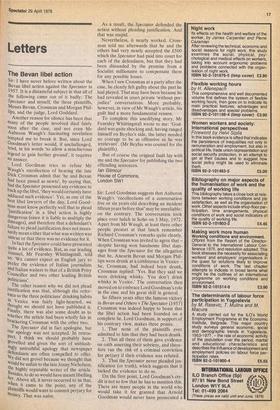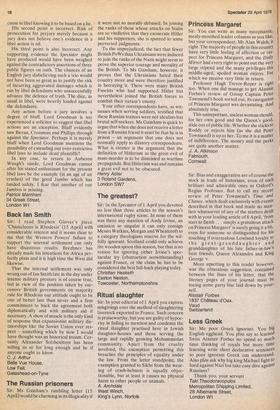Sir: Lord Goodman suggests that Auberon Waugh's 'recollections of a
conversation five or six years old describing an incident fifteen years before that' may be unreliable: on the contrary. The conversation took place over lunch in Soho on 3 May, 1972. Apart from Mr Waugh, at least three other people present at that lunch remember Richard Crossman's remarks quite clearly. When Crossman was invited to agree that — despite having won handsome libel damages from the Spectator for the allegation that he, Aneurin Bevan and Morgan Phillips were drunk at a conference in Venice — he, Crossman, had indeed been drunk, Crossman replied: 'Yes. But they said we were drinking whisky. You don't drink whisky in Venice.' The conversation then moved on to embrace Lord Goodman's role in the case and his great skill in general.
So fifteen years after the famous victory in Bevan and Others v The Spectator (1957) Crossman was indeed happy to boast that the libel action had been founded on a complete lie. Lord Goodman, in support of his contrary view, makes three points.
1. That none of the plaintiffs ever admitted to him that they had been drunk.
2. That all three of them gave evidence on oath asserting their sobriety, and therefore ran the risk of a criminal conviction for perjury if their evidence was refuted.
3. That the Spectator never pleaded justification (or truth), which suggests that it lacked the evidence to do so.
On the first point, Lord Goodman's credit is not so low that he has to mention this.
There are many people in the world who would take it for granted that Arnold Goodman would never have prosecuted a cause in libel knowing it to be based on a lie, His second point is incorrect. Risk of prosecution for perjury merely because a jury does not believe one's evidence in a libel action is nil.
His third point is also incorrect. Any supporting evidence the Spectator might have produced would have been weighed against the contradictory assertions of three public figures on oath. The chances of an English jury disbelieving such a trio would not have been so great as to justify the risk of incurring aggravated damages which is run by libel defendants who unsuccessfully advance the defence of truth. The dice, as usual in libel, were heavily loaded against the defendants.
Any action before a jury involves a degree of bluff. Lord Goodman is too experienced a solicitor to suggest that libel actions are an exception. Bluff evidently saw Bevan, Crossman and Phillips through against the Spectator. Perhaps it is merely bluff when Lord Goodman mentions the possibility of extending our over-restrictive libel laws to include dead plaintiffs?
In any case, to return to Auberon Waugh's simile, Lord Goodman cannot after his stated enthusiasm for the present libel laws be the example (in an age of air crashes) of the good Jumbo which has landed safely. I fear that another of our Jumbos is missing.
Patrick Mamham 34 Greek Street, London W1



































 Previous page
Previous page